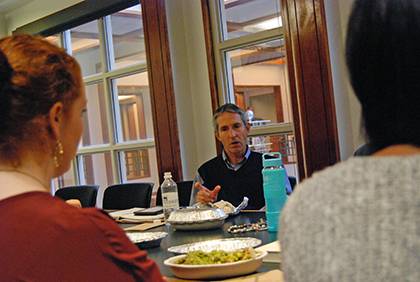Want to Start a Book Club?
Kenan Institute funding supports book groups to increase dialogue about ethics

Gathered around a table in a conference room at the Sanford School of Public Policy, eight staff members opened up about a very personal topic: death.
Each took turns sharing stories about his or her connection, whether it was caring for a loved one or witnessing end of life care for others.
“This gave us the opportunity to reflect on the experiences we’ve had with our own parents, close relatives and friends and think about our lives and the care we want once we reach retirement age and beyond,” said Jim Gudaitis, director of advancement services with Sanford’s Development and Alumni Relations office.
The conversation was guided by a shared experience of reading the book “Being Mortal” by Atul Gawande, a nonfiction book about quality of life, aging, hospice care and death. It was the “homework” for the group’s monthly book club, which has read a new book and met almost every month since February to share lunch and impressions of new reading material. Participants take turns choosing books to read and leading discussions with the group.
“I’ve always enjoyed reading, but reading in order to share our thoughts and reactions is what keeps me excited about this,” said LaRae Didier, a program assistant with Sanford’s Duke Center for International Development. “It’s a way to connect with my community at Sanford and read on topics that bring on important discussions.”
To help facilitate the club, Didier and her colleagues received financial support from the Kenan Institute for Ethics, which supplies up to $500 to Duke community members to start books clubs as a way to incorporate topics of ethics in their daily life.
Michaela Dwyer, who oversees the program and organizes her own book club with Kenan coworkers, said funding can go toward purchasing books or freebies for club participants, like food.
“We’re such diverse collection of people across campus, but the benefit of something like a book club is the themes we discuss can relate to the work we’re all doing,” said Dwyer, Stephen and Janet Bear Postgraduate Fellow in Ethics at Kenan. “Our hope is to present ethics as an every day interaction that can be conveyed through character behavior and engage with each other in a new way.”
There is no formal application process to establish a book club with Kenan funding, but faculty and staff interested in starting a book club can contact Dwyer via email at michaela.dwyer@duke.edu to discuss options of how to set a group up. As ethics-centered book clubs, Dwyer noted that participants should be invested in discussions that take this theme info account.
While just one of the discussions Didier and her colleagues held was around death, Dwyer and her club have had success talking about a range of books, including “Americanah,” the 2014 summer reading for Duke first-year students about a Nigerian woman who flees a military dictatorship to attend college in the U.S.
“It turned out another staff member had a Nigerian friend and was able to share insight about the book and its characters we never would have known about,” Dwyer said. “Putting it into real life terms and knowing about that connection made me want to know more.”